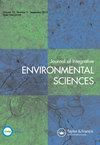Analysing Latin American and Caribbean forest vulnerability from socio-economic factors
IF 3.5
4区 环境科学与生态学
Q3 ENVIRONMENTAL SCIENCES
Journal of Integrative Environmental Sciences
Pub Date : 2017-01-01
DOI:10.1080/1943815X.2017.1400981
引用次数: 3
Abstract
Abstract Latin American and Caribbean (LAC) forest cover reduced by 9% from 1990 to 2015, affecting biodiversity, climate change mitigation and ecosystem service functionality. These losses are caused by a myriad of interconnected, interdependent and often socio-economic processes, which forest vulnerability metrics largely ignore in their assessments. To address this, we develop the Deforestation Vulnerability Index (DVI) to identify spatial and temporal patterns of forest vulnerability from socio-economic processes. Composed of 13 socio-economic indicators, the DVI was applied to 24 LAC countries, and three provincial (sub-national) examples for the period 2000–2010. The DVI showed that vulnerability declined in more than 60% of countries, due to governance improvements and reductions in agricultural expansion. Provincial application of the index showed provinces to be more vulnerable than countries, due largely to higher economic dependence upon agriculture. Observed vulnerability reductions, whilst deforestation continues, may demonstrate a lag between socio-economic improvements and subsequent deforestation reductions, or the effects of omitted or unidentified vulnerability indicators. The DVI represents a simple, yet effective tool whose outputs could be used by policy-makers and stakeholders to source vulnerability at the scale of application, whilst assisting in directing reactive and responsive sustainable forest management strategies and decision-making.从社会经济因素分析拉丁美洲和加勒比森林的脆弱性
从1990年到2015年,拉丁美洲和加勒比地区的森林覆盖减少了9%,影响了生物多样性、减缓气候变化和生态系统服务功能。这些损失是由无数相互关联、相互依存且往往是社会经济过程造成的,而森林脆弱性指标在其评估中基本上忽略了这些过程。为了解决这个问题,我们开发了森林砍伐脆弱性指数(DVI),以确定社会经济过程中森林脆弱性的时空格局。DVI由13个社会经济指标组成,在2000-2010年期间应用于24个拉丁美洲国家和3个省(次国家)的例子。指数显示,由于治理改善和农业扩张减少,60%以上的国家的脆弱性有所下降。各省对该指数的应用表明,各省比国家更脆弱,这在很大程度上是由于各省对农业的经济依赖程度较高。观察到的脆弱性减少,同时森林砍伐继续,可能表明社会经济改善与随后的森林砍伐减少之间存在滞后,或被遗漏或未查明的脆弱性指标的影响。DVI是一种简单而有效的工具,其产出可被决策者和利益攸关方用于在应用规模上查找脆弱性,同时协助指导被动响应的可持续森林管理战略和决策。
本文章由计算机程序翻译,如有差异,请以英文原文为准。
求助全文
约1分钟内获得全文
求助全文
来源期刊

Journal of Integrative Environmental Sciences
ENVIRONMENTAL SCIENCES-
CiteScore
3.90
自引率
0.00%
发文量
13
审稿时长
>12 weeks
期刊介绍:
Journal of Integrative Environmental Sciences (JIES) provides a stimulating, informative and critical forum for intellectual debate on significant environmental issues. It brings together perspectives from a wide range of disciplines and methodologies in both the social and natural sciences in an effort to develop integrative knowledge about the processes responsible for environmental change. The Journal is especially concerned with the relationships between science, society and policy and one of its key aims is to advance understanding of the theory and practice of sustainable development.
 求助内容:
求助内容: 应助结果提醒方式:
应助结果提醒方式:


